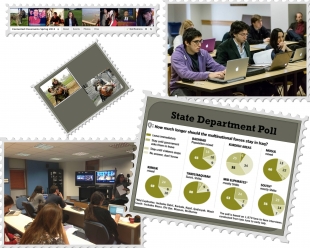
IR 4118 STUDENTS REFLECT ON THEIR ICT COURSE
This semester, IR 4118 course -âTurkey and United States: Common Concerns and New ICT Instrumentsâ- had started by the collaboration of Bilkent University with Montclair State University and U.S. Department of State Office of e-Diplomacy.
Throughout the course students are tasked to prepare projects and presentations on contemporary concerns and issues that influence both Turkish and American foreign policy agendas in 21st century, with the guidance of their lecturers, Dr. Nida Shoughry (Bilkent University) and Dr. Zsolt Nyiri (Montclair State University), In addition, students also participate in weekly discussions via video conferences, where they learn about cultural determinants of comprehending key events and conflicts. ââIt opens the mind to various viewpoints and perspectivesââ says Chelsea Wuesthoff (MSU) about the course. ââI think this is extremely important in order to be diplomatic; to see and understand various perspectives, viewpoints and opinions...ââ.
Studentsâ first assignment was to prepare a presentation as a team about the 5 sources that they will find about public opinion on 2003 U.S. invasion of Iraq. Teams were instructured to use under-utilized technologies (WEBEX, VTC, Skype, Google Hangout, Facebook) in order to prepare their projects, since the process of researching the sources required deliberative and interactive communication. ââIt was difficult to find the time that fits for everyone because of the timezone differences- but after our first Google Hangout session, I understood the vitality of meeting with my team members face-to-face to come up with the best work and to contribute evenlyââ says Yigit Mahmutoglu (BU), while explaining the technical difficulties of preparing a joint presentation with students from U.S.
In last weekâs session, teams consisted of two American and two Turkish students presented their projects to their peers and instructors. Team members used multiple sources of comics, video montages, polls, song lyrics, newspaper articles, and TV coverages and managed to interpret the sources geo-politically in their assignments. As a result, anti-invasionist references from China, Turkey, England, U.S., Russia, South Korea, Italy and Iran outweighted the group presentations, although pro-invasionist sources from Germany, Israel and U.S and neutral sources from Austria, Israel, and U.S. were mentioned.
In the aftermath, students from Bilkent University and Montclair State University evaluated the methods of the course while revealing their expectations from the joint-lectures and discussions. ââI expect the course to provide me with greater insight into the understanding of public opinion mechanisms especially in the MENA region and I expect to collaborate very frequently with Turkish colleagues, as to be able to create a network of people able to rely in the future as well for possible career opportunitiesââ says Lorenzo Fleishhacker. Conversely, Selay Siperoglu (BU) says, âI took this course due to the importance of Turkey and U.S. alliance and to witness different peopleâs views on certain issue from different culturesââ adding, ââThe course feeds my expectations so far and I believe that it will help me to improve myself a lot until the end of the semesterâ.
Throughout the course students are tasked to prepare projects and presentations on contemporary concerns and issues that influence both Turkish and American foreign policy agendas in 21st century, with the guidance of their lecturers, Dr. Nida Shoughry (Bilkent University) and Dr. Zsolt Nyiri (Montclair State University), In addition, students also participate in weekly discussions via video conferences, where they learn about cultural determinants of comprehending key events and conflicts. ââIt opens the mind to various viewpoints and perspectivesââ says Chelsea Wuesthoff (MSU) about the course. ââI think this is extremely important in order to be diplomatic; to see and understand various perspectives, viewpoints and opinions...ââ.
Studentsâ first assignment was to prepare a presentation as a team about the 5 sources that they will find about public opinion on 2003 U.S. invasion of Iraq. Teams were instructured to use under-utilized technologies (WEBEX, VTC, Skype, Google Hangout, Facebook) in order to prepare their projects, since the process of researching the sources required deliberative and interactive communication. ââIt was difficult to find the time that fits for everyone because of the timezone differences- but after our first Google Hangout session, I understood the vitality of meeting with my team members face-to-face to come up with the best work and to contribute evenlyââ says Yigit Mahmutoglu (BU), while explaining the technical difficulties of preparing a joint presentation with students from U.S.
In last weekâs session, teams consisted of two American and two Turkish students presented their projects to their peers and instructors. Team members used multiple sources of comics, video montages, polls, song lyrics, newspaper articles, and TV coverages and managed to interpret the sources geo-politically in their assignments. As a result, anti-invasionist references from China, Turkey, England, U.S., Russia, South Korea, Italy and Iran outweighted the group presentations, although pro-invasionist sources from Germany, Israel and U.S and neutral sources from Austria, Israel, and U.S. were mentioned.
In the aftermath, students from Bilkent University and Montclair State University evaluated the methods of the course while revealing their expectations from the joint-lectures and discussions. ââI expect the course to provide me with greater insight into the understanding of public opinion mechanisms especially in the MENA region and I expect to collaborate very frequently with Turkish colleagues, as to be able to create a network of people able to rely in the future as well for possible career opportunitiesââ says Lorenzo Fleishhacker. Conversely, Selay Siperoglu (BU) says, âI took this course due to the importance of Turkey and U.S. alliance and to witness different peopleâs views on certain issue from different culturesââ adding, ââThe course feeds my expectations so far and I believe that it will help me to improve myself a lot until the end of the semesterâ.



